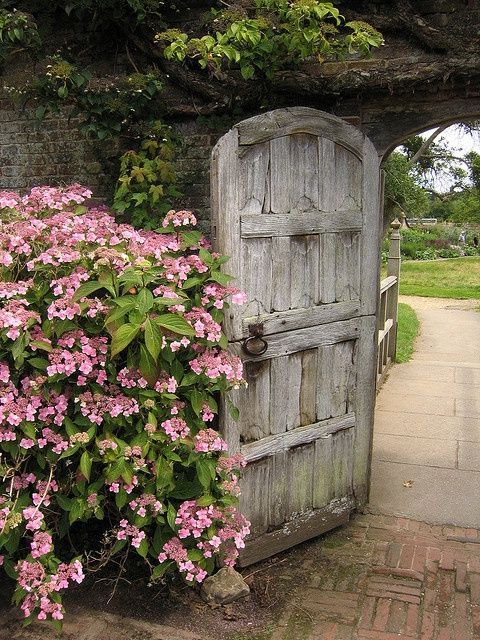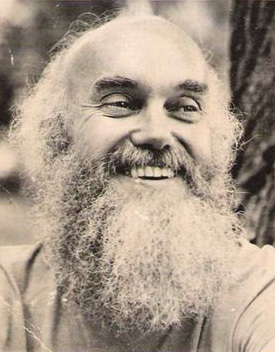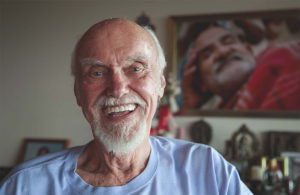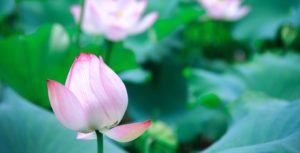 Open Door Dharma Circles
Open Door Dharma Circles
Open Door via Zoom*
The Zoom link is open a few minutes before each session. All are welcome, no charge.May 1 – June 5, 2022
- Wednesdays, April–June 1 | 8:00–9:00 am
- Sunday May 1 | 4:30–6:00 pm
- Sunday June 5 | 4:30–6:00 pm
- All times are Pacific Daylight time
What is this path?
 More than fifty years ago, an Indian sage known as Neem Karoli Baba (affectionately called Maharajji) drew countless Western seekers to the Himalayan foothills, where they were immersed in the timeless path of devotion, wisdom, and service to the world. (One of those seekers was an American named Richard Alpert.)
Maharajji offers a path of deep love and engaged spirituality, a way to be active in our daily roles and responsibilities without forgetting who we really are. We only need to soften the grip of the heavily layered, habituated identities we’ve been assigned and adopted in the course of our lives.
In Open Door Dharma gatherings, our tapestry of spiritual practice and service includes Buddhist wisdom, Hindu devotional practices, chanting and meditation, woven together with threads of the world’s enduring spiritual traditions. This is the ground from which true service arises.
All backgrounds, experience, and curiosity are welcome. Sweet voices and creaking pipes all chant together. Longtime devotees and practitioners join friends just beginning their spiritual exploration. Together we’re learning how contemporary Western dharma, with roots in ancient Eastern traditions, can flourish and be fruitful in our lives, here and now.
More than fifty years ago, an Indian sage known as Neem Karoli Baba (affectionately called Maharajji) drew countless Western seekers to the Himalayan foothills, where they were immersed in the timeless path of devotion, wisdom, and service to the world. (One of those seekers was an American named Richard Alpert.)
Maharajji offers a path of deep love and engaged spirituality, a way to be active in our daily roles and responsibilities without forgetting who we really are. We only need to soften the grip of the heavily layered, habituated identities we’ve been assigned and adopted in the course of our lives.
In Open Door Dharma gatherings, our tapestry of spiritual practice and service includes Buddhist wisdom, Hindu devotional practices, chanting and meditation, woven together with threads of the world’s enduring spiritual traditions. This is the ground from which true service arises.
All backgrounds, experience, and curiosity are welcome. Sweet voices and creaking pipes all chant together. Longtime devotees and practitioners join friends just beginning their spiritual exploration. Together we’re learning how contemporary Western dharma, with roots in ancient Eastern traditions, can flourish and be fruitful in our lives, here and now.
Ram Dass
 In the late 1960s, a one-time Harvard psychology professor named Dr. Richard Alpert was among the first wave of Westerners who went to India seeking a deeper meaning and understanding of life that western culture didn’t offer. Many of them eventually found themselves sitting at Maharajji’s feet in the Kumaon foothills of the Himalayas. From the professor’s first encounter with Neem Karoli Baba, his life was changed–and the rest is history, as they say.
Maharajji gave Richard Alpert the Hindu name Ram Dass, which means Servant of God. In India, Ram Dass immersed himself deeply in meditation, knowledge, and practices that loosen our attachment to separate ego-identified roles. He brought Maharajji’s teachings back to the US, where countless students and scholars, housewives and hippies, activists and artists from all backgrounds were ripe to listen. The counterculture generation of that era flocked to Ram Dass’s workshops, retreats, lectures, interviews, and books, where his intellectual
In the late 1960s, a one-time Harvard psychology professor named Dr. Richard Alpert was among the first wave of Westerners who went to India seeking a deeper meaning and understanding of life that western culture didn’t offer. Many of them eventually found themselves sitting at Maharajji’s feet in the Kumaon foothills of the Himalayas. From the professor’s first encounter with Neem Karoli Baba, his life was changed–and the rest is history, as they say.
Maharajji gave Richard Alpert the Hindu name Ram Dass, which means Servant of God. In India, Ram Dass immersed himself deeply in meditation, knowledge, and practices that loosen our attachment to separate ego-identified roles. He brought Maharajji’s teachings back to the US, where countless students and scholars, housewives and hippies, activists and artists from all backgrounds were ripe to listen. The counterculture generation of that era flocked to Ram Dass’s workshops, retreats, lectures, interviews, and books, where his intellectual  clarity and sense of humor blended with devotion, insight, and compassion. His commitment to the fundamental teaching to love and serve everyone and remember God reflected his surrender to his guru.
Spiraling forward from that time, Ram Dass’s work continued to echo and open hearts around the world. In the late 1970s and ’80s, his work with death and dying further honed his understanding of service. His engagement in the development of holistic, sustainable business principles influenced a generation of idealistic entrepreneurs and public servants.
With colleagues in Seva Foundation, Ram Dass supported innovative international public health programs restoring sight to the blind in India and Nepal and developed programs to serve underprivileged communities in the U.S. and Mexico. Touring widely, he encouraged the creation of scores of small service groups across North America to shape a range of locally relevant, heart-centered service programs wherever they lived.
Service was Ram Dass’s vehicle for deepening his spiritual immersion in Maharajji’s wisdom throughout his life, even after experiencing a catastrophic, near-fatal stroke in 1996. He continued writing and teaching from his wheelchair for more than 20 years, pouring himself into service until his death on December 22, 2019.
Ram Dass’s life work of books and articles can readily be found online and in bookstores and libraries. A great array of additional material from conversations, letters, lectures, and countless notes are being housed and made publicly available electronically at ramdass.org.
clarity and sense of humor blended with devotion, insight, and compassion. His commitment to the fundamental teaching to love and serve everyone and remember God reflected his surrender to his guru.
Spiraling forward from that time, Ram Dass’s work continued to echo and open hearts around the world. In the late 1970s and ’80s, his work with death and dying further honed his understanding of service. His engagement in the development of holistic, sustainable business principles influenced a generation of idealistic entrepreneurs and public servants.
With colleagues in Seva Foundation, Ram Dass supported innovative international public health programs restoring sight to the blind in India and Nepal and developed programs to serve underprivileged communities in the U.S. and Mexico. Touring widely, he encouraged the creation of scores of small service groups across North America to shape a range of locally relevant, heart-centered service programs wherever they lived.
Service was Ram Dass’s vehicle for deepening his spiritual immersion in Maharajji’s wisdom throughout his life, even after experiencing a catastrophic, near-fatal stroke in 1996. He continued writing and teaching from his wheelchair for more than 20 years, pouring himself into service until his death on December 22, 2019.
Ram Dass’s life work of books and articles can readily be found online and in bookstores and libraries. A great array of additional material from conversations, letters, lectures, and countless notes are being housed and made publicly available electronically at ramdass.org.
